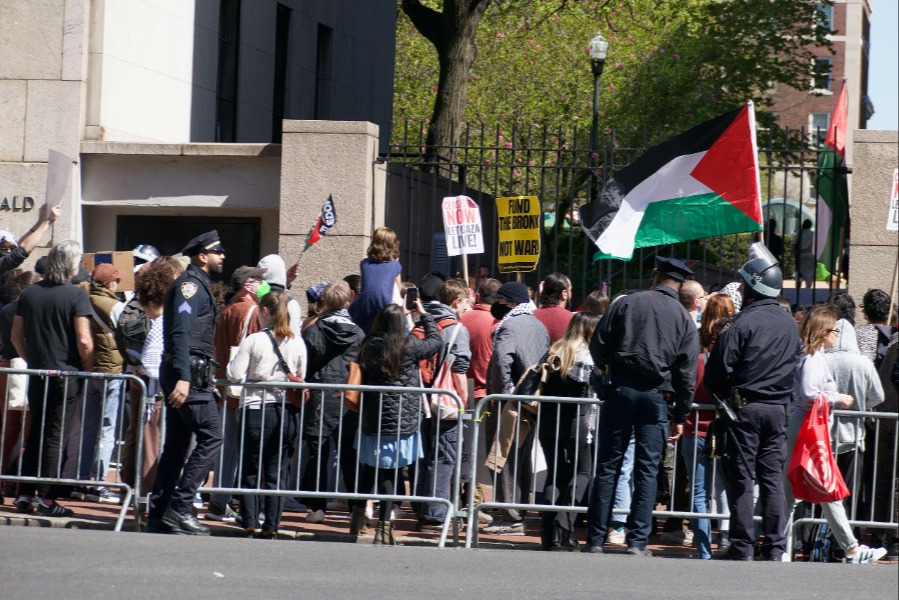Response to Steve Vladeck on the Hernandez Briefing
My recent post on the top-side briefing in Hernandez v. Mesa, the Fourth Amendment cross-border shooting case pending at the Supreme Court, struck a nerve with my friend Steve Vladeck, who is one of the able attorneys representing the parents of the deceased teenager Hernandez.
Published by The Lawfare Institute
in Cooperation With

My recent post on the top-side briefing in Hernandez v. Mesa, the Fourth Amendment cross-border shooting case pending at the Supreme Court, struck a nerve with my friend Steve Vladeck, who is one of the able attorneys representing the parents of the deceased teenager Hernandez.
Steve disagrees with my suggestion that the thrust of their opening brief is that the functional, flexible, open-ended test for application of the Habeas Suspension Clause outside U.S. borders announced in Boumediene v. Bush (2008) should apply generally to decide which other constitutional provisions protect noncitizens abroad. No doubt for prudent strategic reasons, the brief filed by Steve and co-counsel does attempt to frame this case as a very narrow one, stating that it “does not involve extraterritoriality of the Fourth Amendment more broadly” (p. 25), but only concerns application of that Amendment to conduct by a U.S.-based official that affected a noncitizen "in an enclosed area patrolled by federal agents" (p. 14), "just steps from the formal boundary line," in "an intertwined, binational border community" (p. 13).
But I think it is fair to say that the brief also sweeps broadly and reveals the larger implications of the case. On page one, the brief states that "[t]his Court should make clear that our border is not an on/off switch for the Constitution’s most fundamental protections.” The brief states multiple times that the issue posed is “extraterritorial application” of the Fourth Amendment (pp. i, 13, 14, 19, 21) and “questions of extraterritoriality” of constitutional protections (pp. 12, 15, 17, 18). The discussion in the brief of the key Supreme Court precedent, Boumediene— which broke with over 200 years of consistent case law and political branch practice holding that the Constitution does not protect noncitizens outside U.S. borders—points to the broad implications of this case, beyond just the Fourth Amendment and beyond just a narrow strip at the border: “This Court in Boumediene held that ‘de jure sovereignty’ is not and never has been ‘the only relevant consideration in determining the geographic reach of the Constitution’ because 'questions of extraterritoriality turn on objective factors and practical concerns, not formalism'" (p. 12).
Steve also disagrees with my take on the briefing of the Bivens issue—that is, whether there should be recognized here the judicially-created remedy of a constitutional damages action to vindicate a purported Fourth Amendment right. Case law has established that courts should analyze whether there are "special factors" counseling against recognizing a Bivens remedy in a particular context. National security concerns are one possible special factor. As his brief did, Steve argues that national security concerns are essentially irrelevant here because the case concerns only "the unique context of uses of force at the border." I disagreed with that—perhaps not clearly enough—by making a point that Chief Justice Rehnquist had in United States v. Verdugo-Urquidez, the 1990 decision which held that the Fourth Amendment did not apply extraterritorially to a search in Mexico by U.S. and Mexican law enforcement of the home of a Mexican national detained in the U.S. on criminal charges. Verdugo arose in a narrow context—an evidence suppression motion in a criminal prosecution. But as the majority opinion by Rehnquist noted, ruling for the criminal defendant would have created a precedent that could have much wider effects, implicating national security in deleterious ways:
The United States frequently employs armed forces outside this country—over 200 times in our history—for the protection of American citizens or national security. Application of the Fourth Amendment to those circumstances could significantly disrupt the ability of the political branches to respond to foreign situations involving our national interest. Were respondent to prevail, aliens with no attachment to this country might well bring actions for damages to remedy claimed violations of the Fourth Amendment in foreign countries or in international waters. See Bivens v. Six Unknown Federal Narcotics Agents, 403 U. S. 388 (1971); cf. Tennessee v. Garner, 471 U. S. 1 (1985); Graham v. Connor, 490 U. S. 386 (1989). Perhaps a Bivens action might be unavailable in some or all of these situations due to "special factors counselling hesitation'". . ., but the Government would still be faced with case-by-case adjudications concerning the availability of such an action. And even were Bivens deemed wholly inapplicable in cases of foreign activity, that would not obviate the problems attending the application of the Fourth Amendment abroad to aliens. The Members of the Executive and Legislative Branches are sworn to uphold the Constitution, and they presumably desire to follow its commands. But the Court of Appeals' global view of its applicability would plunge them into a sea of uncertainty as to what might be reasonable in the way of searches and seizures conducted abroad.
If the bright line rule of Verdugo—that noncitizens outside U.S. territory have no Fourth Amendment rights—is broken down, even if a Supreme Court decision doing so contained language (as Boumediene did) suggesting it is limited to a particular context, the political branches would need to assess the likelihood that the decision would be read by lower courts or the Supreme Court to reach other contexts, including ones at the core of any conception of national security. The legal uncertainty created as those issues are sorted out would, in my view, be significant and likely damaging. And that would be nothing compared to the major effects on national security if it became clear over time that the Fourth Amendment was understood by the courts to apply to activities like extraterritorial surveillance of noncitizens for intelligence purposes.
I think it would be hard to rule for the Hernandez parties and reject the bright-line rule of Verdugo without causing significant legal uncertainty, at a minimum, for the executive branch in many key national security areas like surveillance. Steve and his co-counsel disagree (p. 25)—at least for now. But what arguments might they or other lawyers make in the future on behalf of noncitizen clients affected outside the United States by U.S. national security policies, if the Supreme Court rejects Verdugo's bright line for the Fourth Amendment in Hernandez? The test used in Boumediene to determine the extraterritorial reach of the Suspension Clause is custom-made for expansion—as the briefing in Hernandez shows. It is “an extraordinarily open-ended test” that “includes either six or seven factors (the Court described it as three) and is nonexclusive, unweighted, and largely undefined by the Court” (see here at pp. 247-48). A “test” so amorphous probably just boils down to whether five justices believe judicial review under the Constitution is, in their estimation, salutary in a given context.
Depending on its scope, a Fourth Amendment extended abroad to protect noncitizens could reach potentially millions more possible plaintiffs than the habeas right in Boumediene did. That's not to say that everyone or even many people would have colorable lawsuits. The standing doctrine, the political question doctrine, and many other roadblocks could await such plaintiffs. But constitutional rules constrain the executive even if not judicially enforced, and lawsuits can deter and otherwise impact the executive even if they are not successful. As an example, Bobby Chesney has documented how Boumediene caused the U.S. military to significantly alter arrest and detention procedures in the Afghanistan and Iraq theaters to account for the possibility of judicial review (for citations, see here at pp. 248 n.410).
A final point of disagreement. I wrote that, contra the Hernandez brief (at p. 1) there is not now and would not be a “legal no-man’s land in which federal agents can kill innocent civilians with impunity,” even if the Hernandez parties are not victorious. Steve seems to dismiss as “illusory” any law that will not be judicially-enforced in a potentially successful lawsuit. That is a common view today (see, for example, the recent exchange at Just Security where Philip Bobbitt made this point about Jameel Jaffer’s new book). But internal executive branch law compliance in areas where there is little or no judicial review can be a meaningful and important check. For instance, there must be numerous civilians in places like Iraq and Afghanistan who would have been killed or maimed but for the fact that the U.S. military takes seriously its jus in bello obligations under international humanitarian law, even though courts have a sharply limited role in applying it. (Contrast with how the Syrian military and its Russian, Iranian, and Hezbollah allies fight.)
Judicially-enforced law surely provides even greater checks on executive conduct than law applied by the executive alone, but as the Supreme Court has recognized in many contexts (qualified immunity, the political question doctrine, the state secrets privilege, etc.), litigation against the government is far from costless. The U.S. government looks like it needs to do a better job of internally enforcing the rules and laws that should restrain border patrol agents from misusing deadly force. It would be appropriate for courts to take into account comparative institutional competence in this regard when making case-by-case decisions about authorizing Bivens suits against officers.
But, to return to where I started, a Supreme Court decision ruling for the Hernandez parties could have far-reaching consequences for U.S. law enforcement, intelligence, military, customs, and immigration policies and practices, well beyond the border patrol context. That is the difficulty with Bivens suits, as I have written. In earlier eras, someone like the Hernandez parties would have had a common law tort suit and might have received compensation and some measure of vindication, while perhaps also deterring future shootings by other officers. But combined actions by Congress and the Court mean that, if tort suits are to go forward against individual U.S. officials, it usually has to be under the Constitution. And constitutional law, especially when announced by the Supreme Court, has pervasive, prospective effects on government action, sometimes in contexts far removed from those giving rise to the constitutional tort suit. Because of the breadth of the Fourth Amendment, that would almost surely be the case here.





